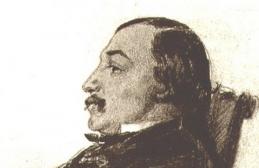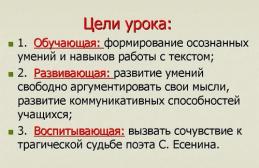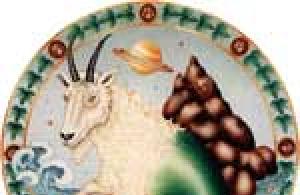Slide 1
 Slide 2
Slide 2
 Slide 3
Slide 3
 Slide 4
Slide 4
 Slide 5
Slide 5
The presentation on the topic "Franz Schubert" can be downloaded absolutely free on our website. Project subject: MHC. Colorful slides and illustrations will help you engage your classmates or audience. To view the content, use the player, or if you want to download the report, click on the corresponding text under the player. The presentation contains 5 slide(s).
Presentation slides

Slide 1
great Austrian composer, one of the founders of romanticism in music, author of about 600 songs, nine symphonies (including the famous " Unfinished Symphony"and also large quantity chamber and solo piano music.

Slide 2
In the field of song, Schubert was a successor to Beethoven. Thanks to Schubert, this genre received art form, enriching the concert area vocal music. The ballad “The Forest King,” written in 1816, brought fame to the composer. Soon after it, “The Wanderer”, “Praise of Tears”, “Zuleika” and others appeared.

Slide 4
In the field of opera, Schubert was not so gifted; although he wrote about twenty of them, they will add little to his glory. Among them stands out “Conspirators, or Home war" Certain numbers of his operas (for example, Rosamund) are quite worthy of a great musician. Of Schubert's numerous church works (masses, offertories, hymns, etc.), the Mass in E-flat major is especially distinguished by its sublime character and musical richness. Schubert's musical productivity was enormous. Beginning in 1813, he composed incessantly.

Slide 5
According to biographers, Schubert never changed anything in his compositions, because he did not have it for that time. He did not spare his health and, in the prime of his life and talent, died at the age of 31. The last year of his life, despite his poor health, was especially fruitful: it was then that he wrote a symphony in C major and a mass in E flat major. During his lifetime he did not enjoy outstanding success. After his death, a mass of manuscripts remained that later saw the light of day (six masses, seven symphonies, fifteen operas, etc.).
Tips for making a good presentation or project report
- Try to involve the audience in the story, set up interaction with the audience using leading questions, a game part, do not be afraid to joke and smile sincerely (where appropriate).
- Try to explain the slide in your own words, add additional interesting facts; you don’t just need to read the information from the slides, the audience can read it themselves.
- There is no need to overload the slides of your project with text blocks; more illustrations and a minimum of text will better convey information and attract attention. The slide should contain only key information; the rest is best told to the audience orally.
- The text must be well readable, otherwise the audience will not be able to see the information being presented, will be greatly distracted from the story, trying to at least make out something, or will completely lose all interest. To do this, you need to choose the right font, taking into account where and how the presentation will be broadcast, and also choose the right combination of background and text.
- It is important to rehearse your report, think about how you will greet the audience, what you will say first, and how you will end the presentation. Everything comes with experience.
- Choose the right outfit, because... The speaker's clothing also plays a big role in the perception of his speech.
- Try to speak confidently, smoothly and coherently.
- Try to enjoy the performance, then you will be more relaxed and less nervous.
Presentation about Franz Schubert - a story about life and work outstanding composer. Germany considers him its genius. However, his fame spread far beyond the borders of the country, so all over the world they know his name and listen to his works, although the great figure lived in the late 18th - first half of the 19th century. Music teachers or the Moscow Art Theater can download the manual to tell middle or high school students the story of Schubert’s life.
The story about the composer begins with interesting fact. The boy was born into a large family. He was not the first or second child, but the twelfth. Two more were born after him. Thus, there were a total of 14 brothers and sisters in the family. As a child, he mastered the violin, piano, and played the organ. This, apparently, pushed him to create his own works. And he has them huge amount. These are songs, symphonies, and arias. And also sonatas, overtures, quartets. His creativity was so fruitful that he could sometimes compose 10 songs a day.


Biography. Biography. Franz Schubert ( full name Franz Peter) Austrian composer, the largest representative of early romanticism. Creator of romantic songs and ballads, vocal cycles, piano miniatures, symphonies, and instrumental ensembles. Songfulness permeates works of all genres. Author of about 600 songs, including from the cycles “The Beautiful Miller's Wife” (1823), “Winter Reise” (1827, both based on the words of the German poet Wilhelm Müller); 9 symphonies (including “Unfinished”, 1822), quartets, trios, piano quintet “Forellen” (“Trout”, 1819); piano sonatas (over 20 pieces), impromptu, fantasies, waltzes, landlers. Franz Schubert (full name Franz Peter) was an Austrian composer, the largest representative of early romanticism. Creator of romantic songs and ballads, vocal cycles, piano miniatures, symphonies, and instrumental ensembles. Songfulness permeates works of all genres. Author of about 600 songs, including from the cycles “The Beautiful Miller's Wife” (1823), “Winter Reise” (1827, both based on the words of the German poet Wilhelm Müller); 9 symphonies (including “Unfinished”, 1822), quartets, trios, piano quintet “Forellen” (“Trout”, 1819); piano sonatas (over 20 pieces), impromptu, fantasies, waltzes, landlers.

Childhood years. Early works Schubert. Franz Schubert was born on January 31, 1797, in Vienna, in the family of a school teacher. Exceptional musical abilities Schubert appeared in early childhood. From the age of seven he studied playing several instruments, singing, and theoretical disciplines. Franz sang in the Imperial Court Chapel under the direction of the outstanding Viennese composer and teacher Antonio Salieri, who, noticing the boy’s talent, began teaching him the basics of composition. By the age of seventeen, Schubert was already an author piano pieces, vocal miniatures, string quartets, symphonies and operas "The Devil's Castle". Franz Schubert was born on January 31, 1797, in Vienna, in the family of a school teacher. Schubert's exceptional musical abilities were evident in early childhood. From the age of seven he studied playing several instruments, singing, and theoretical disciplines. Franz sang in the Imperial Court Chapel under the guidance of the outstanding Viennese composer and teacher Antonio Salieri, who, noticing the boy's talent, began teaching him the basics of composition. By the age of seventeen, Schubert was already the author of piano pieces, vocal miniatures, string quartets, a symphony and the opera The Devil's Castle. While working as a teacher's assistant at his father's school (), Schubert continued to compose intensively. This includes numerous songs (including such masterpieces as “Margarita at the Spinning Wheel” and “The Forest King”)) While working as an assistant teacher at his father’s school (), Schubert continued to compose intensively. This includes numerous songs (including such masterpieces as “Margarita at the Spinning Wheel” and “The Forest King”))

Songs of Franz Schubert. For a long time, F. Schubert was known mainly for his songs for voice and piano. Essentially, it began with Schubert new era in the history of German vocal miniature, prepared by the flowering of German lyric poetry of the late 18th and early 19th centuries. He wrote music based on poems by poets himself different levels, from the great J.V. Goethe (about 70 songs), F. Schiller (over 40 songs) and G. Heine (6 songs from “Swan Song”) to relatively little-known writers and amateurs (for example, on the poems of his friend I. Mayrhofer Schubert composed about 50 songs). In addition to a huge spontaneous melodic gift, the composer had unique ability convey through music both the general atmosphere of the poem and its semantic shades. Beginning with his earliest songs, he inventively used the capabilities of the piano for sound-depicting and expressive purposes; Thus, in “Margarita at the Spinning Wheel,” the continuous figuration of sixteenth notes represents the rotation of the spinning wheel and at the same time sensitively reacts to all changes in emotional tension. For a long time, F. Schubert was known mainly for his songs for voice and piano. Essentially, with Schubert a new era began in the history of German vocal miniature, prepared by the flowering of German lyric poetry in the late 18th and early 19th centuries. He wrote music based on poems by poets of various levels, from the great J. V. Goethe (about 70 songs), F. Schiller (over 40 songs) and G. Heine (6 songs from “Swan Song”) to relatively little-known writers and amateurs (for example, Schubert composed about 50 songs based on the poems of his friend I. Mayrhofer). In addition to his enormous spontaneous melodic gift, the composer had a unique ability to convey through music both the general atmosphere of a poem and its semantic shades. Beginning with his earliest songs, he inventively used the capabilities of the piano for sound-depicting and expressive purposes; Thus, in “Margarita at the Spinning Wheel,” the continuous figuration of sixteenth notes represents the rotation of the spinning wheel and at the same time sensitively reacts to all changes in emotional tension. Schubert's songs are extremely varied in form: from simple strophic miniatures to freely constructed vocal scenes, which often consist of contrasting sections. Having discovered Müller's lyrics, which tell of the wanderings, sufferings, hopes and disappointments of a lonely romantic soul, Schubert created vocal loops“The Beautiful Miller's Maid” and “Winter Retreat” are essentially the first large series of monologue songs in history connected by a single plot. Schubert's songs are extremely varied in form, from simple strophic miniatures to freely constructed vocal scenes, which are often composed of contrasting sections. Having discovered Müller's lyrics, which tell of the wanderings, sufferings, hopes and disappointments of a lonely romantic soul, Schubert created the vocal cycles “The Beautiful Miller's Wife” and “Winter Reise”, essentially the first large series of monologue songs in history, connected by a single plot.




Recent years. Recent years. From 1826 to 1828, Schubert lived in Vienna, with the exception of a short stay in Graz. The position of vice-kapellmeister in the chapel of the imperial court, for which he applied in 1826, did not go to him, but to Joseph Weigl. On March 26, 1828, he gave his only public concert, which brought him 800 guilders. Meanwhile, his numerous songs were published and piano works. From 1826 to 1828, Schubert lived in Vienna, with the exception of a short stay in Graz. The position of vice-kapellmeister in the chapel of the imperial court, for which he applied in 1826, did not go to him, but to Joseph Weigl. On March 26, 1828, he gave his only public concert, which brought him 800 guilders. Meanwhile, his numerous songs and piano works were published. The composer died on November 19, 1828, at the age of 31, after a two-week fever. According to his last wishes, Schubert was buried in the Wehring cemetery, where the year before, Beethoven, whom he idolized, was buried. An eloquent inscription is engraved on the monument: “Death buried here a rich treasure, but even more wonderful hopes.” On January 22, 1888, his ashes were reburied at the Vienna Central Cemetery. The composer died on November 19, 1828, at the age of 31, after a two-week fever. According to his last wishes, Schubert was buried in the Wehring cemetery, where the year before, Beethoven, whom he idolized, was buried. An eloquent inscription is engraved on the monument: “Death buried here a rich treasure, but even more wonderful hopes.” On January 22, 1888, his ashes were reburied at the Vienna Central Cemetery.

Franz Peter Schubert
1797-1828
Great Austrian composer,
one of the first representatives
musical romanticism
...Confiding,
frank,
incapable of
betrayal,
communicative,
talkative,
in a joyful mood Franz Peter Schubert (31 January 1797-
November 19, 1828) - great
Austrian composer, one of
the founders of romanticism in
music. He wrote about 600 songs,
nine symphonies, liturgical
music and many operas, as well as
a large number of chamber and
solo piano music.
The Schubert family loved music, but
allowed only as a hobby;
the profession of a musician was considered
not honorable enough. Franz Schubert was born in 1797 on the outskirts of Vienna
- Lichtenthal. His father school teacher,
came from a peasant family.
Mother was the daughter of a mechanic.
The family loved music very much and constantly
Musical evenings were organized.
From the age of six he attended parish school,
and the household taught him to play the violin and
piano.
At the age of eleven, Franz was accepted into
Konvict - the court chapel, where, in addition to singing,
studied playing many instruments and music theory
Leaving the chapel in 1813, Schubert settled
teacher at school.
In the field of songs Schubert
was the successor
Beethoven Schubert could not easily make a name for himself in music
the world and so on
way to promote the popularity of your music. Not
contributed
This is the character of the composer, his complete immersion
in an essay
music, modesty and at the same time the highest creative
integrity, which did not allow going to any lengths
compromises.
But he found understanding and support among his friends. Around
Schubert grouped a circle of creative youth, each
of whose members must certainly have some kind of artistic talent Participants of the “Schubertiads”
became the first listeners, and often co-authors. The heyday of Schubert's work - the 20s. IN
this is the time being created
best instrumental works:
lyrical-dramatic
"Unfinished" symphony (1822) and epic,
life-affirming major (last, ninth in a row). Both
symphonies for a long time
were unknown: C major was
discovered by R. Schumann in 1838, and
“Unfinished” - found only in 1865.
Both symphonies had
influence on composers of the second half of the 19th century
c., defining various
the path of romantic symphonism.
Thanks to his beautiful voice V
at the age of eleven years Franz was
adopted by the "singing boy" in
Vienna Court Chapel and
Konvikt (boarding school). There it is
Josef von Spaun became friends,
Albert Stadler and Anton
Holzapfel. Wenzel Ruzicka
taught Schubert the general bass,
later Antonio Salieri took Schubert
to your place for free training,
taught counterpoint and
composition (until 1816). Schubert
not only did he sing, but also
got acquainted with instrumental
works by Joseph Haydn and
Wolfgang Amadeus Mozart, since
he was the second violin in the orchestra
Konvicta. Schubert never in his works
didn't change anything because I didn't have
for that time. He did not spare his
health and in the prime of life and talent
died at the age of 31.
The last year of his life, despite
upset health, was especially
fruitful: it was then that he wrote
Symphony in C major and Mass in E flat
major During his lifetime he did not use
outstanding success. After his death
a lot of manuscripts remained, only later
who saw the light.
The composer died of typhoid fever in
Vienna November 19, 1828 According to
last wishes, Schubert
buried in the cemetery where a year before
that whom he idolized was buried
Beethoven.
"Death buried here
rich treasure, but still
more beautiful hopes"
Franz Peter Schubert
1797-1828
Austrian composer, the largest representative of early romanticism



- Franz Schubert was born on January 31, 1797 on the outskirts of Vienna. His father was a school teacher - a hardworking and respectable man who sought to raise his children in accordance with his ideas about the path of life. The eldest sons followed in their father's footsteps, and the same path was prepared for Schubert. But there was also music in the house. On holidays a circle of musicians gathered here - lovers, the father himself taught Franz to play the violin, and one of the brothers - on the clavier.

This is what the Vienna area looked like:
where the imperial royal convict was located, in which he lived Franz Schubert.

- In 1810, Schubert wrote his first composition. The passion for music embraced him more and more and gradually crowded out all other interests. He was oppressed by the need to study something that was far from music, and after five years, without finishing the convict, Schubert left it. This led to a deterioration in relations with his father, who was still trying to guide his son “on the right path.” Yielding to him, Franz entered the teachers' seminary, and then acted as an assistant teacher at his father's school.

Franz Schubert
(left, at the piano) with friends.
Watercolor by Leopold Kupelwieser.


- Schubert entered the most intense period of his work (1814-1817), without hearing his father's warnings. By the end of this period, he was already the author of five symphonies, seven sonatas and three hundred songs, among which there are such as “Margarita at the Spinning Wheel”, “The Forest King”, “Trout”, “Wanderer” - they are known, they are sung. It seems to him that the world is - now friendly arms will open for him, and he decides to take the extreme step - quits service. In response, the indignant father leaves him without any means of support and essentially breaks off relations with him.


- From 1826 to 1828 Schubert lived in Vienna. On 26 March 1828 he gave his only public concert of his career, which earned him 800 guilders. Meanwhile, his numerous songs and piano works were published.
- The composer died on November 19, 1828 at the age of 31. The inscription is engraved on the monument: “Death buried here a rich treasure, but even more wonderful hopes.” On January 22, 1888, his ashes were reburied at the Vienna Central Cemetery.









